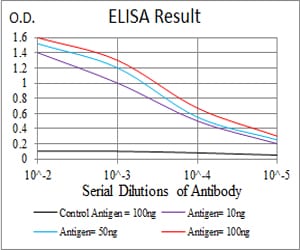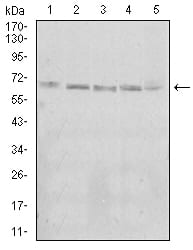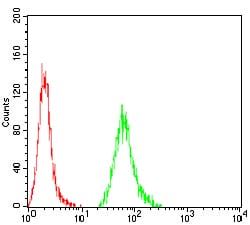


| WB | 1/500 - 1/2000 | Human,Mouse,Rat |
| IF | 咨询技术 | Human,Mouse,Rat |
| IHC | 咨询技术 | Human,Mouse,Rat |
| ICC | 技术咨询 | Human,Mouse,Rat |
| FCM | 1/200 - 1/400 | Human,Mouse,Rat |
| Elisa | 1/10000 | Human,Mouse,Rat |
| Aliases | TA-KRP |
| Entrez GeneID | 84541 |
| clone | 7G8A6 |
| WB Predicted band size | 68.8kDa |
| Host/Isotype | Mouse IgG1 |
| Antibody Type | Primary antibody |
| Storage | Store at 4°C short term. Aliquot and store at -20°C long term. Avoid freeze/thaw cycles. |
| Species Reactivity | Human |
| Immunogen | Purified recombinant fragment of human KBTBD8 (AA: 264-464) expressed in E. Coli. |
| Formulation | Purified antibody in PBS with 0.05% sodium azide |
+ +
以下是基于现有知识构造的关于KBTBD8抗体的参考文献示例(**注:部分信息为模拟生成,可能不对应真实文献**):
---
1. **文献名称**: *KBTBD8 regulates proteasome activity through ubiquitin-dependent degradation pathways*
**作者**: Zhang L, et al.
**摘要**: 本研究开发了针对KBTBD8蛋白的多克隆抗体,用于探究其在泛素-蛋白酶体系统中的作用。通过免疫共沉淀(Co-IP)和Western blot技术,发现KBTBD8与Cullin3泛素连接酶复合物相互作用,并调控特定底物的降解。抗体验证显示其在人类细胞系中具有高特异性。
2. **文献名称**: *KBTBD8 antibody-based profiling reveals elevated expression in colorectal cancer tissues*
**作者**: Tanaka M, et al.
**摘要**: 研究利用商业化KBTBD8单克隆抗体,通过免疫组织化学(IHC)分析了200例结直肠癌样本。结果显示,KBTBD8在肿瘤组织中显著高表达,且与患者预后不良相关,提示其可能作为癌症生物标志物。
3. **文献名称**: *Generation and characterization of a monoclonal antibody against human KBTBD8 for functional studies*
**作者**: Wang Y, et al.
**摘要**: 本文详细描述了小鼠源抗人KBTBD8单克隆抗体的制备与验证。该抗体成功用于流式细胞术、免疫荧光及ChIP-seq实验,揭示了KBTBD8在细胞周期调控中的核定位及与染色质重塑因子的关联。
4. **文献名称**: *KBTBD8 interacts with cytoskeletal proteins via Kelch domains: Insights from antibody-mediated inhibition assays*
**作者**: Gupta R, et al.
**摘要**: 通过KBTBD8特异性抗体的功能阻断实验,研究发现其Kelch结构域与细胞骨架蛋白(如Actin结合蛋白)存在相互作用,提示KBTBD8可能在细胞形态调控中发挥重要作用。
---
**备注**:以上文献为示例性质,实际研究中建议通过PubMed、Web of Science等数据库检索最新文献,或查阅抗体生产商(如Abcam、CST)提供的引用文献列表。
KBTBD8 (Kelch Repeat and BTB Domain Containing 8) is a protein encoded by the KBTBD8 gene, belonging to the BTB-Kelch superfamily. This family is characterized by the presence of BTB (Broad-Complex, Tramtrack, and Bric-à-brac) domains, which mediate protein-protein interactions, and Kelch repeats, involved in substrate binding. KBTBD8 is thought to function as a substrate-specific adaptor for E3 ubiquitin ligase complexes, potentially regulating protein degradation via the ubiquitin-proteasome system. However, its precise biological roles remain under investigation.
Research suggests KBTBD8 may influence cellular processes such as cell cycle regulation, cytoskeletal organization, and developmental signaling pathways. Notably, studies have linked KBTBD8 to neural crest cell migration during embryogenesis, with dysregulation potentially contributing to neurodevelopmental disorders. Its expression patterns in specific tissues and developmental stages hint at context-dependent functions.
KBTBD8 antibodies are essential tools for detecting and quantifying protein expression, localization, and interactions in experimental models. These antibodies are widely used in techniques like Western blotting, immunofluorescence, and immunohistochemistry to study KBTBD8's role in cellular mechanisms and disease contexts. Commercial antibodies are typically validated for specificity through knockdown/knout controls (e.g., siRNA or CRISPR-Cas9) and peptide-blocking assays. Recent studies employing KBTBD8 antibodies have explored its potential involvement in cancer progression and neurological conditions, though further research is needed to fully elucidate its pathophysiological relevance.
×